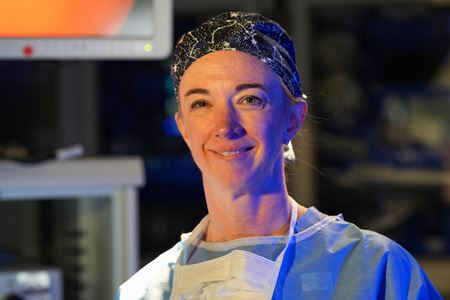Jennifer Choi, MD, was once told anyone who cared about family shouldn’t become a surgeon. She didn’t accept it.
Today Choi is a professor of clinical surgery at Indiana University School of Medicine and was recently appointed as senior associate dean for Graduate Medical Education (GME). Her research focuses on surgical education and bariatric surgery, and she has co-authored more than 30 peer-reviewed publications in her field. Choi directed the General Surgery Residency program before stepping into leadership with GME. In her new role, she leads an office supporting more than 1,440 residents and fellows in all medical specialties.
She’s also mom to two teens and is married to anesthesiologist Alex Choi, MD, MPH, who serves on the board of directors for the American Society of Anesthesiologists. They met as students at IU School of Medicine.
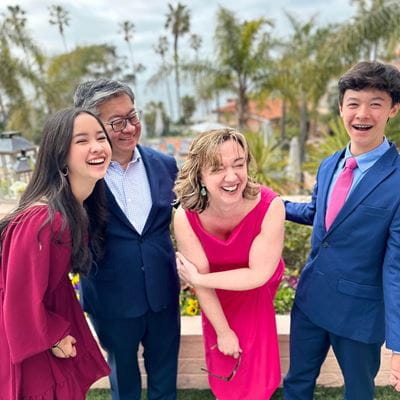 “There were a lot of presumptions of what it took to be a surgeon and what you’d have to give up — I was told it wasn’t the right thing for a woman,” Choi said of the conventional wisdom in the late 1990s. “When I interviewed with Karen West for medical school, it helped me gain courage.”
“There were a lot of presumptions of what it took to be a surgeon and what you’d have to give up — I was told it wasn’t the right thing for a woman,” Choi said of the conventional wisdom in the late 1990s. “When I interviewed with Karen West for medical school, it helped me gain courage.”
A professor emeritus of surgery at IU School of Medicine, West, MD, was IU’s first pediatric surgery fellow. In 1984, West became the first practicing female surgeon at Riley Hospital for Children. By the time Choi met her, West had nearly two decades of surgical experience.
“Karen was one of my mentors, and she was influential for me as a student and as a resident,” Choi said. “She was a person who did care about her family and did care about her patients and did care about surgery.”
Choi also gives credit to Jay Grosfeld, MD, the surgery department’s chair from 1985-2005, for intentionally expanding opportunities for women to train in the historically male-dominated field.
“Dr. Grosfeld was welcoming and progressive for that time,” Choi said. “On campus, I felt encouraged and supported. There were several female residents.”
Today, more than half of all surgery residents at IU School of Medicine are female.
Becoming a surgeon
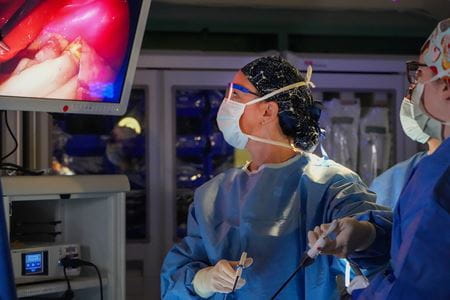 Choi grew up in Princeton, Indiana, a small town in the southwest part of the state where she played sports and developed an interest in science. Her parents were not in health careers, but they were highly involved in the community — Choi’s mother was the first woman president of the local Kiwanis Club. Choi went to Taylor University, a private Christian school in Upland, Indiana, on the pre-med track and seized an opportunity to do an internship at a mission hospital in Nigeria, where she fell in love with the work of a surgeon.
Choi grew up in Princeton, Indiana, a small town in the southwest part of the state where she played sports and developed an interest in science. Her parents were not in health careers, but they were highly involved in the community — Choi’s mother was the first woman president of the local Kiwanis Club. Choi went to Taylor University, a private Christian school in Upland, Indiana, on the pre-med track and seized an opportunity to do an internship at a mission hospital in Nigeria, where she fell in love with the work of a surgeon.
“Even as an undergrad, with no medical experience, I felt I was useful and part of the team,” Choi recalled. “I learned how surgery could meet my love of science and my interest in fixing things. I’m very tactile — I like working with my hands.”
The mission surgeons, however, discouraged women from entering such a demanding field. So, when Choi became a medical student at IU School of Medicine, she thought she might pursue family medicine, which would allow her to perform some minor surgeries.
Then came her general surgery rotation.
“I just loved it,” Choi said. “It wasn’t hard for me to get out of bed in the morning. I could do unlimited hours in surgery.”
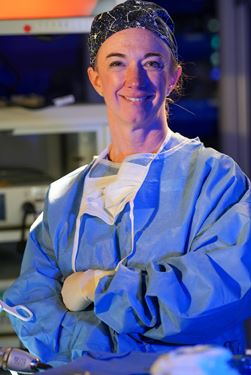 Encouraged by West’s example and the inclusive environment at IU, Choi decided to follow her passion. After earning her medical degree, Choi completed her General Surgery residency and a fellowship in minimally invasive and bariatric surgery at IU School of Medicine, then joined the faculty in the Department of Surgery.
Encouraged by West’s example and the inclusive environment at IU, Choi decided to follow her passion. After earning her medical degree, Choi completed her General Surgery residency and a fellowship in minimally invasive and bariatric surgery at IU School of Medicine, then joined the faculty in the Department of Surgery.
During her first year on faculty, Choi gave birth to her first child.
“The comments back then were that women were going to work part time and not want to work as hard as men,” Choi recalled. “Thankfully, these comments don’t come up anymore.”
While more women are entering the surgical field and advancing through the ranks, disparities still exist in leadership, Choi said. She sees that improving as today’s female trainees rise to become tomorrow’s leaders.
Becoming a leader in graduate medical education
When Gary Dunnington, MD, became the surgery department chair in 2012, he brought a renewed focus on surgical education that inspired Choi.
“Dr. Dunnington helped me desire to be an educator, in addition to being an administrative leader,” she said.
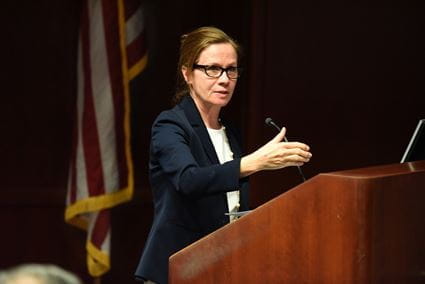 Choi became the associate residency program director in 2011 and subsequently the program’s director in 2014. She estimates just 10-15% of surgical residencies in the U.S. were led by women at that time.
Choi became the associate residency program director in 2011 and subsequently the program’s director in 2014. She estimates just 10-15% of surgical residencies in the U.S. were led by women at that time.
“At surgery conferences, the women’s bathroom line was always short,” Choi said.
On the national level, Choi became involved with the American College of Surgeons, the Association of Surgical Education, and the Association of Program Directors in Surgery (APDS). She is currently serving as president of the APDS.
At IU, Choi’s focus has now expanded to all aspects of Graduate Medical Education. She became associate dean for GME in July 2022 and has enjoyed a transition into the senior associate dean role with mentorship from previous GME leader Michelle Howenstine, MD, who served in the role from 2015-24 and is credited with building an inclusive process for residents and fellows to engage in program governance.
“Dr. Choi and I spent a year together working on all the GME initiatives, including financial budgeting, legal oversight work, the creation of professional development opportunities for program leadership, initiation of unique GME trainee pathways and hospital initiatives,” Howenstine said.
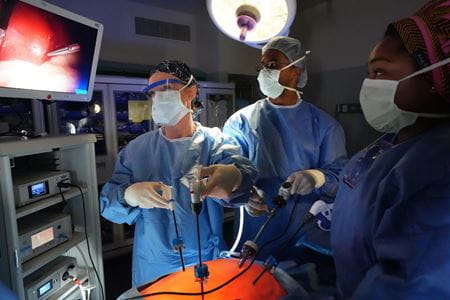 As the leader of GME, Choi’s primary responsibility is to ensure IU School of Medicine is providing quality training that fulfills accreditation requirements. GME also serves as the human resources office for all residents and fellows at IU School of Medicine.
As the leader of GME, Choi’s primary responsibility is to ensure IU School of Medicine is providing quality training that fulfills accreditation requirements. GME also serves as the human resources office for all residents and fellows at IU School of Medicine.
Zeina Nabhan, MD, the associate dean for GME, works with Choi on inclusive recruitment, wellness initiatives, data strategy and accreditation.
“Dr. Choi is a compassionate leader who has extensive knowledge in the GME space,” Nabhan said.
Howenstine called Choi “a proven advocate for the residents and fellows.”
“Dr. Choi is supported by an experienced and talented GME staff, and I am certain she will be successful in leading an advancing IU School of Medicine institutional GME program,” Howenstine said.
 Women in Leadership at IU School of Medicine
Women in Leadership at IU School of Medicine
Women are leading the way in helping Indiana University School of Medicine fulfill its mission to advance health in the state of Indiana and beyond by promoting innovation and excellence in education, research and patient care. The Women in Leadership series celebrates the contributions of women who have emerged as strong leaders within the medical school and in their respective fields of expertise.
